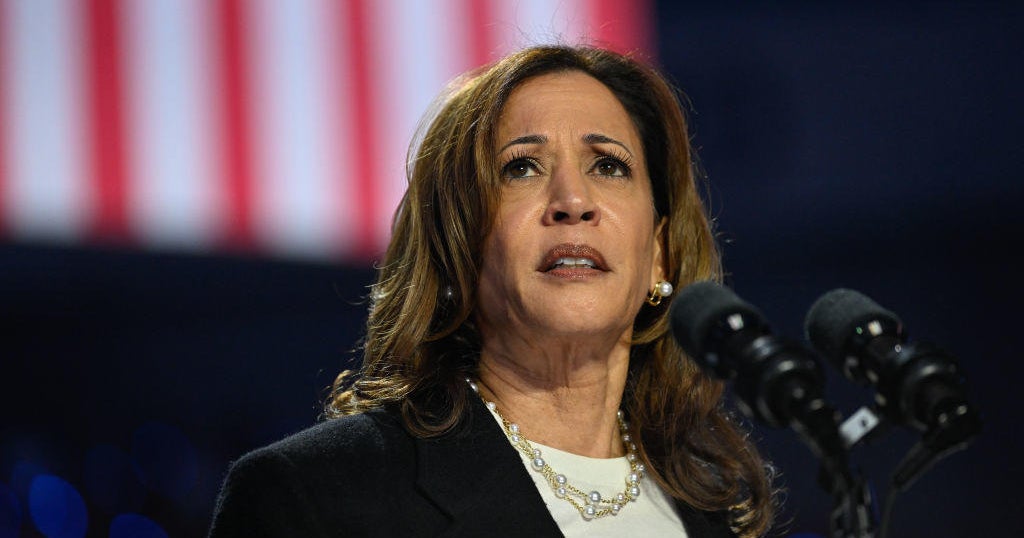CBS News
U.S. announces more aid for Ukraine at “critical moment” in war with Russia, but Zelenskyy says more is needed

Ramstein Air Base, Germany — Ukrainian President Volodymyr Zelenskyy rarely attends the security summits organized by his Western partners in person, but on Friday, he paid his first visit to the sprawling Ramstein Air Base in Germany, where U.S. Secretary of Defense Lloyd Austin declared in his opening remarks of the latest such meeting that “it is a critical moment” in the war ignited by Russia’s 2022 full-scale invasion.
The gathering of the Ukraine Defense Contact Group comes days after Zelenskyy’s nation suffered its single worst attack of the year, when two ballistic missiles slammed into a military academy in Poltava, killing dozens of people and wounding more than 170 others.
The meeting in Germany also comes on the heels of a wider, blistering Russian barrage of missile and drone attacks across Ukraine. It comes after Ukraine announced the fatal crash of an F-16 fighter jet during that barrage. And it comes one month after Ukrainian forces invaded Russia’s western Kursk region, seizing hundreds of square miles of territory.
“The Kremlin’s army of aggression is now on the defensive on its own turf,” Austin said Friday of the Kursk offensive.
“This is the land from which Putin was preparing to expand the war into Ukrainian territory. He was preparing to launch a new offense against our city of Sumy,” said Zelenskyy.
The Ukrainian president has said controlling that Russian ground has created a buffer zone between President Vladimir Putin’s forces and Ukrainian territory. But if he was hoping the incursion would force Putin to divert his troops from the battlefields of eastern Ukraine, that hasn’t happened.
“This is a clear choice by Moscow,” Zelenskyy said. “Putin wants more Ukraine to occupy than human security. He doesn’t care about Russian land and people. He just wants to grab as much of our land and as many of our cities as possible.”
On the overnight flight from Andrews Airforce Base near Washington to Ramstein, Chairman of the Joint Chiefs of Staff General Charles “CQ” Brown spoke of the Kursk incursion as just one part of Ukraine’s war strategy.
“What they’ve been able to do in Kursk is to be able to stay successful there and at the same time be able to protect their key lines of communication at Pokrovsk,” he said. “So, it’s a combination of us working with them to identify the capabilities that they have, how they use the forces that they do have, to be successful in both of those areas.”
Ukraine has been losing ground around Pokrovsk, however, and the fall of that logistics hub to Russia would threaten critical supply lines for Ukrainian forces already struggling to hold parts of the roughly 600-mile front line in eastern Ukraine.
It’s a vulnerability that U.S. forces are keeping a close eye on.
“The Russians have been pushing toward their defensive lines and [they’re] starting to gain territory, so what we’re really paying attention to is the rate of advance by the Russians, and when they can get into range of artillery,” said Brown. “This is something we’ll continue to watch on and continue to work with Ukrainians, [on] how to defend that territory.”
Andreas Arnold/picture alliance/Getty
In his own opening remarks at Ramstein, Zelenskyy struck a familiar refrain, stressing that his country needs more air defense systems and more long-range weapons, and soon.
“Thank you so much again,” he told the gathered Western military commanders, “but the number of air defense systems have not yet been delivered easily. This is what was agreed upon, and this is what has not been fully delivered. The world has now systems to ensure that Russian terror does not have results.”
The summit at Ramstein is the 24th meeting of the Ukraine Defense Contact Group, but it’s only the second one Zelenskyy has attended in person.
A major shakeup this week of his war-time cabinet has raised questions at home and among Western partners alike. It included the dismissal of Foreign Minister Dmytro Kuleba, who had become the most familiar face of Ukraine’s foreign policy since the start of the war.
Even before the day of meetings got underway, Austin was the first of the allies to pledge additional support.
“I’m pleased to say that President Biden will announce today and additional $250 million security assistance package for Ukraine,” he said. “It will surge in more capabilities to meet Ukraine’s evolving requirements, and we’ll deliver them at the speed of war.”
The speed of the war is accelerating on both sides, however, and Zelenskyy has made it clear that his country can afford little time to wait.
CBS News
Could the “YIMBY” movement fix America’s affordable housing shortage?

More U.S. cities and states are starting to say “yes, in my backyard” as they struggle to meet the housing needs of growing populations.
The “YIMBY” movement is a political effort to tackle the country’s housing shortage by increasing the housing supply with strategies like changing zoning codes and other regulations that limit home density. The United States is millions of homes short of what’s needed to meet demand, according to the national nonprofit group “Up for Growth.”
Minneapolis resident Bernice Duncan has been searching for a new home with more space for more than five years. The telehealth professional works from home in a cramped two-bedroom apartment she shares with her two adult sons.
“Everybody is not able to move freely, like you would in a in a house or, you know, having your own office space,” said Duncan.
During the years she’s been looking, property values have soared. With a $1,600 monthly housing budget, she says she’s been priced out of the market.
“It’s been a struggle,” Duncan said. “As the economy continues to grow, your paycheck don’t,” she added. “You’re not going to pay less than $2,000.”
Saying “yes” to more housing
Twin-Cities YIMBY was formed in 2023 to advocate for policies that will generate more affordable housing options for people like Duncan. The group supports the elimination of zoning restrictions to allow for more home density across the Minneapolis area.
“In the past five years, our median housing price has increased by $100,000, which is a huge increase” said Paige Kahle, a realtor who founded Twin Cities YIMBY along with colleagues Nichole Hayden and Meghan Howard.
YIMBYs have been building a coalition of pro-housing advocates across the country to counter those who say “not in my back yard,” known as NIMBYs.
“I think it’s getting easier. But literally when you go to the local meetings, the city council meetings, planning commission meetings, there’s still NIMBYs that are very loud and very organized and often kind of angry because they don’t want this kind of housing near them,” said Kahle.
But without a plan to bring housing costs down, Kahle says the shortage is hurting home buyers and renters alike.
“They’re paying 50% of their income, 60% of their income on housing, which just isn’t sustainable,” she said. ”We need more housing and we need it quickly,” said Kahle. “Traditionally, how we’ve addressed the housing crisis is through subsidies, massive subsidies to bring down the cost of housing for folks. But there just aren’t enough subsidies in the world to do that. So, we really need to look at these other mechanisms to increase the density and lower the cost of housing.”
Minneapolis 2040: The city’s plan
Addressing these concerns is the goal of the Minneapolis 2040 Comprehensive Plan. Passed in 2018, the ambitious bipartisan bill implemented historic zoning reforms to increase the number of available housing units including:
- The elimination of single-family-only zoning to permit build duplexes, triplexes and fourplexes in all neighborhoods.
- Height minimums for new residential buildings in high-density zones.
- The elimination of minimum parking requirements for new housing developments.
The plan has faced opposition from some homeowners who argue that increased density could undermine the character and charm of single-family neighborhoods.
“The 2040 Plan will hurt the uniqueness and architectural heritage of many neighborhoods,” said one opponent during a 2018 City Planning Commission meeting.
Implementation of the plan was paused in 2022 after environmental groups filed a lawsuit arguing the plan may have severe unintended consequences to the environment. In May, a state appeals court ruled to lift an injunction on the plan, and just last month the Minnesota State Supreme Court denied a petition for further review of the objections, clearing the way for the plan to continue.
“People want a place that they can live, [where] they can afford to raise their family, that’s safe and affordable. So, it’s really been part of the … regional conversation as well as the national conversation,” said Alene Tchourumoff of the Minneapolis Federal Reserve.
Over the next decade, the Minneapolis Fed is using multiple data sources to track the economic impact of these changes made as part of the 2040 plan.
“We really wanted to have a deeper understanding of what the effects of the policy change would be, recognizing the fact that these important policy changes in housing often take a long time to actually manifest,” said Tchourumoff.
There is some promising early data. According to a report by the Pew Charitable Trust, between 2017 and 2022, nearly 21,000 new units were permitted in Minneapolis — most in buildings with 20 or more units. In that same time, rents in the city rose by just 1% — far less than the rest of Minnesota, which saw a 14% rent increase.
Deregulation across the country
As Minnesota lawmakers consider expanding these rezoning reforms statewide, other states such as California, Oregon, Massachusetts and Montana have already implemented similar YIMBY policies.
The changes in Minneapolis are already making a difference for residents like Rebecca Hemmans, who became a first-time homeowner at 67 after viewing nearly 100 listings.
“I had this dream about living in a single-family home and sitting on my porch with my table of lemonade and glasses for the neighbors to wave at,” Hemmans said.
To accommodate her budget, she chose to adjust her dream — instead of a single-family home, she purchased an attached townhome, and she’s happy with the compromise.
“I don’t have to check with the landlord to say, “Hey, can I do this or do that?” she said. “If I want to paint my walls orange, I can do that.”
CBS News
Iranian hackers attempted to interest Biden staffers with stolen Trump campaign info, FBI says

Iranian hackers sought to interest President Biden’s campaign in information stolen from the rival campaign of former President Donald Trump, sending unsolicited emails to people connected to the Democratic president in an effort to interfere in the 2024 election, the FBI and other federal agencies said Wednesday.
There’s no evidence that any of the recipients responded, officials said, preventing the hacked information from surfacing in the final months of the closely contested election.
The hackers sent emails in late June and early July to people who were associated with Mr. Biden’s campaign before he dropped out. The emails “contained an excerpt taken from stolen, non-public material from former President Trump’s campaign as text in the emails,” according to a U.S. government statement.
In late July, officials with the FBI, the Office of the Director of National Intelligence and the Department of Homeland Security said that Tehran had started a campaign that was working to weaken Trump’s candidacy, while Russia was attempting to do the opposite.
Last month, sources told CBS News that the FBI was investigating whether Iranian hackers had targeted people associated with both the Trump and Biden-Harris campaigns.
In response to the revelation, Harris campaign spokesperson Morgan Finkelstein told CBS News in a statement Wednesday evening that “we’re not aware of any material being sent directly to the campaign,” adding that “a few individuals were targeted on their personal emails with what looked like a spam or phishing attempt.”
Finkelstein said the campaign has “cooperated with the appropriate law enforcement authorities since we were made aware that individuals associated with the then-Biden campaign were among the intended victims of this foreign influence operation.”
Trump campaign spokesperson Karoline Leavitt told CBS News in a statement that “this is further proof the Iranians are actively interfering in the election to help Kamala Harris and Joe Biden because they know President Trump will restore his tough sanctions and stand against their reign of terror.”
The Trump campaign disclosed on Aug. 10 that it had been hacked and said Iranian actors had stolen and distributed sensitive internal documents. At least three news outlets — Politico, The New York Times and The Washington Post — were leaked confidential material from inside the Trump campaign. So far, each has refused to reveal any details about what it received.
Politico reported that it began receiving emails on July 22 from an anonymous account. The source —an AOL email account identified only as “Robert”— passed along what appeared to be a research dossier that the campaign had apparently done on the Republican vice presidential nominee, Ohio Sen. JD Vance. The document was dated Feb. 23, almost five months before Trump selected Vance as his running mate.
A Microsoft threat intelligence report last month provided examples about the actions of Iranian groups seeking to influence the 2024 election.
CBS News
How the “YIMBY” movement seeks to address America’s housing crisis

Watch CBS News
Be the first to know
Get browser notifications for breaking news, live events, and exclusive reporting.










